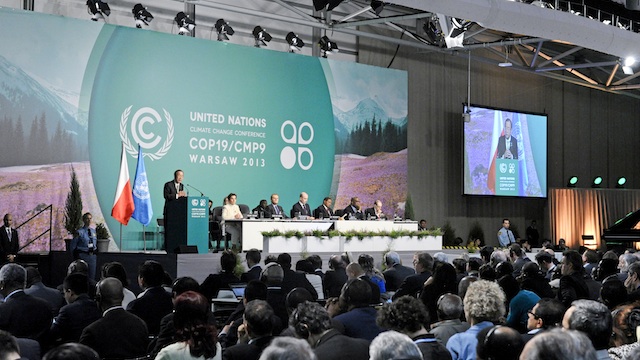SUMMARY
This is AI generated summarization, which may have errors. For context, always refer to the full article.

WARSAW, Poland (UPDATED) – UN negotiators agreed in fraught overtime talks Saturday, November 23, on cornerstone issues of an ambitious, global climate pact to stave off dangerous Earth warming.
While sleep-deprived delegates congratulated themselves on the outcome, which followed 36 hours of non-stop haggling at the end of a fortnight of talks, observers and climate-vulnerable nations said there was not much to be happy about.
“Just in the nick of time, the negotiators in Warsaw delivered enough to keep the process moving,” said climate analyst Jennifer Morgan of the World Resources Institute.
But climate economist Nicholas Stern warned that “the actions that have been agreed are simply inadequate when compared with the scale and urgency of the risks that the world faces from rising levels of greenhouse gases, and the dangers of irreversible impacts.”
Rich and poor nations have been at loggerheads ever since the talks opened on November 11 over who should do what to curb the march of planet warming.
In particular, they clashed over sharing responsibility for curbing climate-altering greenhouse gas emissions, and about funding for vulnerable countries.
The negotiations had threatened to collapse Friday, November 22, amid vehement squabbling between developed and developing nations over their respective contributions to the goal of curbing average planet warming to 2.0 degrees Celsius (3.6 deg Fahrenheit).
The UN-backed target must be reached by national curbs of climate-altering greenhouse gas emissions, but the two camps disagree fundamentally about who must bear the most responsibility.
Emerging economies like China and India objected to any reference in the Warsaw text to “commitments” that would be equally binding to rich and poor states and failed to consider historical greenhouse gas emissions.
Developing nations, their growth largely powered by fossil fuel combustion, blame the West’s long emissions history for the peril facing the planet, and insist their wealthier counterparts carry a larger responsibility to fix the problem.
The West, though, insists emerging economies must do their fair share, given that China is now the world’s biggest emitter of CO2, with India in fourth place after the United States and Europe.
On current emissions trends, scientists warn the Earth could face warming of 4.0 C or higher – a recipe for catastrophic storms, droughts, floods and land-gobbling sea-level rise that would hit poor countries disproportionally hard.
“Climate change represents an urgent and potentially irreversible threat to human societies, future generations and the planet,” warned the Warsaw text.
“Continued emissions of greenhouse gases will cause further warming and changes in all components of the climate system.”
In a breakthrough that followed an intense hour-long emergency huddle, countries agreed on a consensus text outlining the road to a new global warming pact to be signed in Paris by 2015.
In the Warsaw text, negotiators notably replaced the word “commitments” for nationally-determined emissions cuts, with “contributions”.
These must be put forward “well in advance” of the green light.
“It took a lot of effort, you could see a lot of drama and different interests, but in the end… people saw there was a real risk that we would not manage to make the progress that we so badly needed,” said European climate envoy Connie Hedegaard.
Due to enter into effect in 2020, the Paris deal will be the first to bind all nations to curbing atmosphere-polluting greenhouse gas emissions from burning coal, oil and gas.
But getting there is unlikely to be simple.
“As the intense discussions showed, there are serious differences between countries on the tough issues involved in getting a climate deal in Paris in 2015,” said climate analyst Alden Meyer of the US-based Union of Concerned Scientists.
Money crunch
Another bone of contention in the talks is finance.
Developing countries want wealthy states to show how they intend keeping a pledge to bolster public funding for climate aid to $100 billion (74 billion euros) by 2020 – up from $10 billion a year in the period 2010-12.
They also seek more immediate-term help, with China and the Group of 77 developing countries making a last-minute pitch Saturday for pledges of $70 billion per year on the table by 2016.
Still grappling with the global economic crisis, the developed world is wary of committing to a detailed long- or short-term funding plan.
The text did not mention any figures or set any milestones.
“This conference should have been a finance conference,” Bangladeshi negotiator Qamrul Chowdhury told Agence France-Presse. “All we got were peanuts.”
Delegates also compromised on the finance text, which “urges” developed nations to mobilize public funds “at increasing levels” from the 2010-12 period.
Negotiators also finally managed to resolve a third contentious issue by agreeing to create a “loss and damage” mechanism that will “address” future climate harm that vulnerable countries say is no longer avoidable.
The structure, mandate and effectiveness of the “Warsaw international mechanism” must be reviewed in three years’ time. – Rappler.com
Add a comment
How does this make you feel?
There are no comments yet. Add your comment to start the conversation.